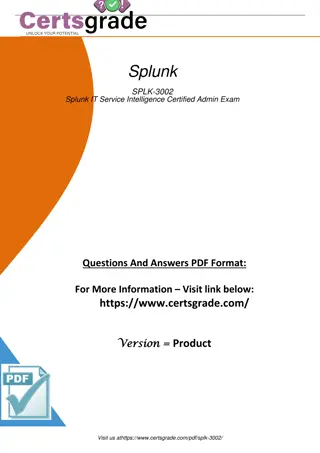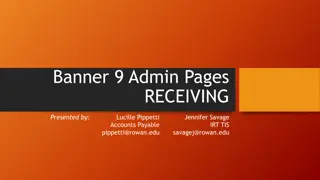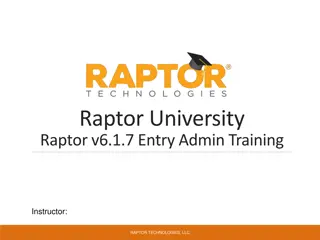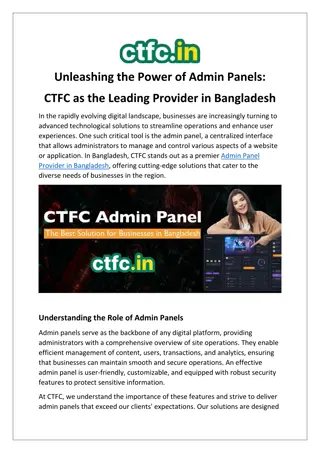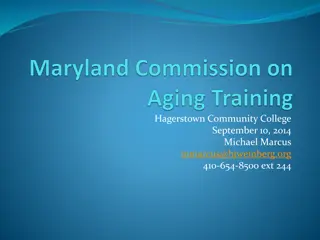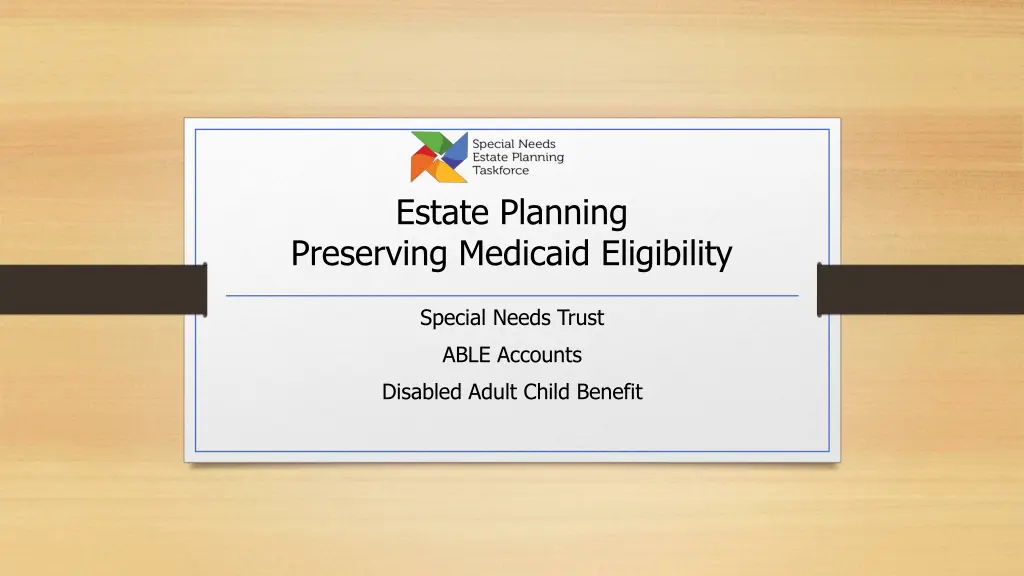
Preserving Medicaid Eligibility Through Special Needs Trusts and ABLE Accounts
Learn how estate planning tools like Special Needs Trusts and ABLE Accounts can help preserve Medicaid eligibility for disabled individuals. Discover how the Special Needs Estate Planning Taskforce assists families in securing the life-long care of their loved ones with disabilities.
Download Presentation

Please find below an Image/Link to download the presentation.
The content on the website is provided AS IS for your information and personal use only. It may not be sold, licensed, or shared on other websites without obtaining consent from the author. If you encounter any issues during the download, it is possible that the publisher has removed the file from their server.
You are allowed to download the files provided on this website for personal or commercial use, subject to the condition that they are used lawfully. All files are the property of their respective owners.
The content on the website is provided AS IS for your information and personal use only. It may not be sold, licensed, or shared on other websites without obtaining consent from the author.
E N D
Presentation Transcript
Estate Planning Preserving Medicaid Eligibility Special Needs Trust ABLE Accounts Disabled Adult Child Benefit
Special Needs Estate Planning Taskforce The Special Needs Estate Planning Taskforce is dedicated to helping families of children with disabilities ensure the life-long care of their loved ones. The task force consists of financial advisors, attorneys and trust officers uniquely armed with the professional expertise and personal knowledge of the challenges and difficulties those families of children with special needs face.
Three Threats To SSI & Medicaid Eligibility 1. Parents receive a Social Security Benefit 2. SSI recipient earns or is given more than $2,000 3. Parents leave an inheritance
Different government benefits coordinate and offset each other: Social Security Disability Benefit Medicare Supplemental Security Benefit (SSI) Financial Needs Test (Must Be Impoverished) Less than $2,000 In Assets No more than $967 Monthly Income (2025) Medicaid
Three Threats To SSI & Medicaid Eligibility 1. Parents receive a Social Security Benefit 2. SSI recipient earns or is given more than $2,000 3. Parents leave an inheritance
Disabled Adult Child Benefit (DAC) Parent receive Social Security Retirement, Disability, or Death Onset date of their child s disability is before age 22 (not the age when parent received a Social Security Benefit) Their Child Is Not Married
Different government benefits coordinate and offset each other: Social Security Disability Benefit Disabled Adult Child Benefit greater than SSI Medicare Supplemental Security Benefit (SSI) Financial Needs Test (Must Be Impoverished) Less than $2,000 In Assets Less than $943 Monthly Income (2024) Medicaid
Different government benefits coordinate and offset each other: Parent receives a Social Security Benefit Social Security Disability Benefit Disabled Adult Child (DAC) Benefit Offset SSI Medicare Supplemental Security Benefit (SSI) Financial Needs Test (Must Be Impoverished) Less than $2,000 In Assets Less than $943 Monthly Income (2024) Medicaid
Different government benefits coordinate and offset each other: Parent receives a Social Security Benefit Social Security Disability Benefit Disabled Adult Child Benefit greater than SSI Medicare Supplemental Security Benefit (SSI) Financial Needs Test (Must Be Impoverished) Less than $2,000 In Assets Less than $943 Monthly Income (2024) Medicaid
Parent receives a Social Security Benefit Social Security will notify DHS that the adult child retains Medicaid DHS sends an SSI Transition Packet to the former SSI recipient (the adult child) The former SSI recipient (the adult child) completes the packet and returns it to DHS
SUGGESTION Complete DHS s Consent For An Authorized Representative form for all your clients. File them with DHS. You will receive copies of all correspondence sent to your clients, including the SSI Transition Packet.
Parent receives a Social Security Benefit Social Security will notify DHS that the adult child retains Medicaid DHS sends an SSI Transition Packet to the former SSI recipient (the adult child) The former SSI recipient (the adult child) completes the packet and returns it to DHS What do you do if that does not occur?
Important Notice For Parents of a Child on Medicaid. Your Child's Eligibility Could Be Terminated When you begin receiving a Social Security benefit (Retirement, Disability, or Death benefit), your child will become eligible for a Disabled Adult Child (DAC) Benefit from Social Security if: 1. 2. Your child s disability began before the age of 22, and, Your child is not married. Your child will receive the Disabled Adult Child (DAC) Benefit monthly. This benefit will offset SSI. If it exceeds your child s SSI, their SSI will cease. This will cause your child to lose their Medicaid eligibility. When this occurs, your child will be eligible to retain or reinstate Medicaid under the Pickle Exception of the Social Security Act. To do so, contact your local Social Security office by phone or in person. Inform them that your child has become eligible for the Disabled Adult Child (DAC) Benefit and that you are requesting the Pickle Exception Letter informing DHS of your child's Medicaid eligibility. The title of the letter is, TITLE II COLA/DAC/WIDOW(ER) MEDICAID EXTENSION REFERRAL Give this notice to the Social Security representative if they are unfamiliar with your request. Ask for a supervisor if that does not work.
Disabled Adult Child Benefit Exception How To Reinstate Medicaid 1. Request a referral letter from the local Social Security office - TITLE II COLA/DAC/WIDOW(ER) MEDICAID EXTENSION REFERRAL 2. Complete a new Medicaid application 3. Email both the Pickle Exception Letter & Medicaid application to: harry@specialneedstaskforce.com 4. If the local Social Security office will not provide the referral letter, contact Harry Ehrenberg at 501-680-2744
Important Notice For Parents of a Child on Medicaid. Your Child's Eligibility Could Be Terminated When you begin receiving a Social Security benefit (Retirement, Disability, or Death benefit), your child will become eligible for a Disabled Adult Child (DAC) Benefit from Social Security if: 1. 2. Your child s disability began before the age of 22, and, Your child is not married. Your child will receive the Disabled Adult Child (DAC) Benefit monthly. This benefit will offset SSI. If it exceeds your child s SSI, their SSI will cease. This will cause your child to lose their Medicaid eligibility. When this occurs, your child will be eligible to retain or reinstate Medicaid under the Pickle Exception of the Social Security Act. To do so, contact your local Social Security office by phone or in person. Inform them that your child has become eligible for the Disabled Adult Child (DAC) Benefit and that you are requesting the Pickle Exception Letter informing DHS of your child's Medicaid eligibility. The title of the letter is, TITLE II COLA/DAC/WIDOW(ER) MEDICAID EXTENSION REFERRAL Give this notice to the Social Security representative if they are unfamiliar with your request. Ask for a supervisor if that does not work.
Disabled Adult Child Benefit Exception How To Reinstate Medicaid Complete a Health Care (Medicaid) application with DAC written on it. Submit it to the county DHS office The county staff have been instructed on how to request verification of DAC entitlement from SSA Contact Harry Ehrenberg at 501-680-2744 if Medicaid is not reinstated.
Three SSI & Medicaid Eligibility Threats 1. Parents receive a Social Security Benefit 2. SSI recipient earns or is given more than $2,000 3. Parents leave an inheritance
ABLE Accounts Achieving a Better Life Experience ABLE Accounts are an affordable savings and investment plan that allows people with disabilities and their families to save and invest money for expenses related to living with a disability.
ABLE preserves benefits Savings in an ABLE account are NOT counted in determining eligibility for any federal needs-based benefits such as Medicaid, SSI*, SSDI, & SNAP. *Exception: Only when the account exceeds $100,000
Qualified Disability Expenses Education Health and Wellness Housing Transportation Legal Fees Financial management Employment training & support Assistive technology Personal support services Oversight and monitoring Funeral and burial expenses
Age Limits To establish an ABLE account, the age of onset of the disability must be before turning 26 years old. However, you do not need to be under 26 to open an ABLE account. You can be older than 26, as long as the disability began before your 26th birthday. Starting January 1, 2026, the age of onset requirement will increase to before turning 46 years old
Contributions Anyone may make contributions into an ABLE account Total annual contributions may not exceed $19,000. Total account balance may not exceed $366,000.
SSI recipient earns or is given more than $19,000 1. They can retain $2,000 2. Pre-pay their funeral 3. Purchase a vehicle 4. 1st Party Special Needs Trust
Three SSI & Medicaid Eligibility Threats 1. Parents receive a Social Security Benefit 2. SSI recipient earns or is given more than $2,000 3.Parents leave an inheritance
Different government benefits coordinate and offset each other: Social Security Disability Benefit Disabled Adult Child Benefit greater than SSI Medicare Supplemental Security Benefit (SSI) Financial Needs Test (Must Be Impoverished) Less than $2,000 In Assets Less than $943 Monthly Income (2024) Medicaid
Options for leaving an inheritance to your child without disqualifying them from government benefits: Establish a Special Needs Trust 3rd Party Special Needs Trust 1st Party Special Needs Trust
3rd Party Special Needs Trust Funded by someone other than the child (typically the parents) Not counted as the child s asset by the government Money can only be used for supplemental needs not for the necessities such as food and shelter (with some exceptions) No minimum or maximum contribution limits Distribution of balance at death: Final expenses, then To those named in the trust document
3rd Party Special Needs Trust ABLE Accounts complement 3rd Party Special Needs Trusts For example, an ABLE Account is more appropriate for paying for housing A 3rd Party Special Needs Trust can fund an ABLE Account.
1st Party Special Needs Trust Funded by the child s assets The child receives an inheritance Can be used if the child has more than $2000 in assets Can be used for Military Survivor Benefit Plan (SBP) Not counted as the child s asset by the government The child must be under 65 years old
1st Party Trust (cont.) Money can only be used for supplemental needs not for necessities such as food and shelter (with some exceptions) No minimum or maximum contribution limits Distribution of balance at death: Final expenses, then Medicaid, up to the amount paid by Medicaid for care of the recipient, then To those named in the trust document
Leaving the child with a disability inheritance to a sibling or other family member There are risks and consequences of directing the child s inheritance to others: Who pays the income tax on the inheritance s future earnings? What happens to the inheritance if the family member is sued? What happens if the family member dies? Is the inheritance protected if the family member has problems with the IRS? What happens if the family member gets divorced? What happens if DHS finds out about the inheritance?
Providing financially for the successor caregiver and their family Establish a Caregiver Trust A way to provide for whoever is the caregiver and for their family Can be used for respite, vacations, or whatever else can provide the caregiver with ways to recharge and avoid burnout The success of the planning is largely dependent on attracting and retaining caregivers
One option: The Special Needs Taskforce Trust System Legacy Trust Receives Money & Property From The Family Invest The Money & The Property Distributes The Money To The Other Trust Special Needs Trust Caregiver Trust Spendthrift Trust
Other Considerations Preparing written instructions of what you want for your child and documenting your child s history Life Care Planning Guide Adequately funding the trust(s)
What can all of us do to help families? Information, Information, Information Available for in-person presentations, remote presentations, recorded webinars, and individual consultations all for no fee, no obligation
For more information and scheduling: Contact: Harry Ehrenberg Email: harry@specialneedstaskforce.com Phone: (501) 680-2744 Appointment: https://calendly.com/specialneedstaskforce/consultation www.specialneedstaskforce.com



